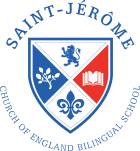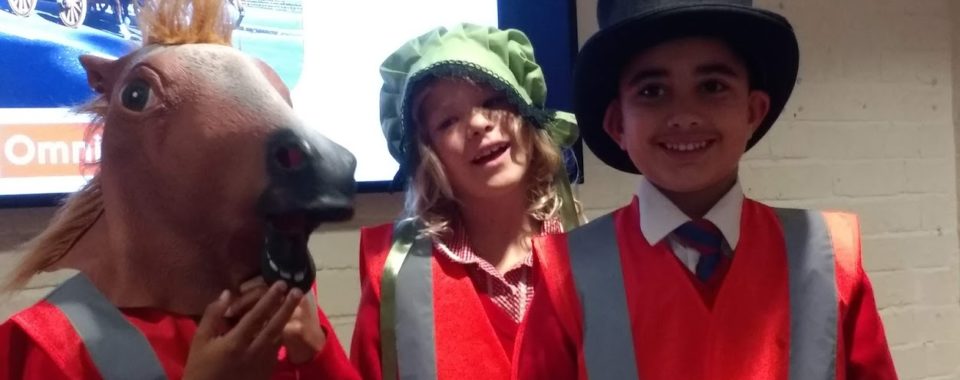History
At Saint Jérôme Church of England Bilingual school, we believe that children deserve a broad, rich, well–connected history curriculum that provides building blocks to help children learn over time. A high-quality history education will help pupils gain a coherent knowledge and understanding of Britain’s past and that of the wider world. Furthermore, history helps pupils to understand the complexity of people’s lives, the process of change, the diversity of societies and relationships between different groups, as well as their own identity and the challenges of their time.
At Saint Jérôme, we aim to inspire our pupils’ curiosity, encouraging them to discover more about the past and ideas of the past. The knowledge and skills that make up History as a subject are delivered through the Cornerstones topics across all year groups.
Using the Cornerstones curriculum, we are able to deliver knowledge rich content while also giving students opportunities to develop history skills through a combination of directed teaching, independent study, group debate and co-creation. In this way, children learn how to ask perceptive questions, think critically, weigh evidence, sift arguments, and develop perspective and judgement.
Over time – and at the right time – children are able to understand substantive concepts, including empire, invasion, war, democracy, parliament, resistance and enslavement, which are sequenced and revisited over time.
The national curriculum for history aims to ensure that all pupils:
- Know and understand the history of these islands as a coherent, chronological narrative, from the earliest times to the present day: how people’s lives have shaped this nation and how Britain has influenced and been influenced by the wider world
- Know and understand significant aspects of the history of the wider world: the nature of ancient civilisations; the expansion and dissolution of empires; characteristic features of past non-European societies; achievements and follies of mankind
- Gain and deploy a historically grounded understanding of abstract terms such as ‘empire’, ‘civilisation’, ‘parliament’ and ‘peasantry’
- Understand historical concepts such as continuity and change, cause and consequence, similarity, difference and significance, and use them to make connections, draw contrasts, analyse trends, frame historically-valid questions and create their own structured accounts, including written narratives and analyses
- Understand the methods of historical enquiry, including how evidence is used rigorously to make historical claims, and discern how and why contrasting arguments and interpretations of the past have been constructed History – key stages 1 and 2
- Gain historical perspective by placing their growing knowledge into different contexts, understanding the connections between local, regional, national and international history; between cultural, economic, military, political, religious and social history; and between short- and long-term timescales.
By the end of Key Stage 1
Pupils will have begun to develop an awareness of the past using common words and phrases relating to the passing of time. They should have an awareness of how the people and events they study fit within a chronological framework and are able to identify similarities and differences between ways of life in different periods. They will have begun to have access to different types of historical source helping them to understand that our historical knowledge comes from many different places.
Pupils will be taught about:
- Changes within living memory – revealing aspects of change in national life.
- Events beyond living memory that are significant nationally or globally [for example, the Great Fire of London, the first aeroplane flight or events commemorated through festivals or anniversaries]
- The lives of significant individuals in the past who have contributed to national and international achievements. Some should be used to compare aspects of life in different periods [for example, Elizabeth I and Queen Victoria, Christopher Columbus and Neil Armstrong, William Caxton and Tim Berners-Lee, Pieter Bruegel the Elder and LS Lowry, Rosa Parks and Emily Davison, Mary Seacole and/or Florence Nightingale and Edith Cavell]
- Significant historical events, people and places in their own locality.
By the end of Key Stage 2
Pupils will continue to develop a chronologically secure knowledge and understanding of British, local and world history, establishing clear narratives within and across the periods they study. They should be able to construct valid questions to support historical enquiry and considering change, cause, similarity, difference and significance. They should be able to construct informed responses that involve thoughtful selection and organisation of relevant historical information and understand how our knowledge of the past is constructed from a range of sources.
Pupils will be taught about:
- Changes in Britain from the Stone Age to the Iron Age
- The Roman Empire and its impact on Britain
- Britain’s settlement by Anglo-Saxons and Scots
- The Viking and Anglo-Saxon struggle for the Kingdom of England to the time of Edward the Confessor
- A local history study
- A study of an aspect or theme in British history that extends pupils’ chronological knowledge beyond 1066
- The achievements of the earliest civilizations – an overview of where and when the first civilizations appeared and a depth study of one of the following: Ancient Sumer; The Indus Valley; Ancient Egypt; The Shang Dynasty of Ancient China
- Ancient Greece – a study of Greek life and achievements and their influence on the western world
- A non-European society that provides contrasts with British history – one study chosen from: early Islamic civilization, including a study of Baghdad c. AD 900; Mayan civilization c. AD 900; Benin (West Africa) c. AD 900-1300.
You can download our curriculum map here.

